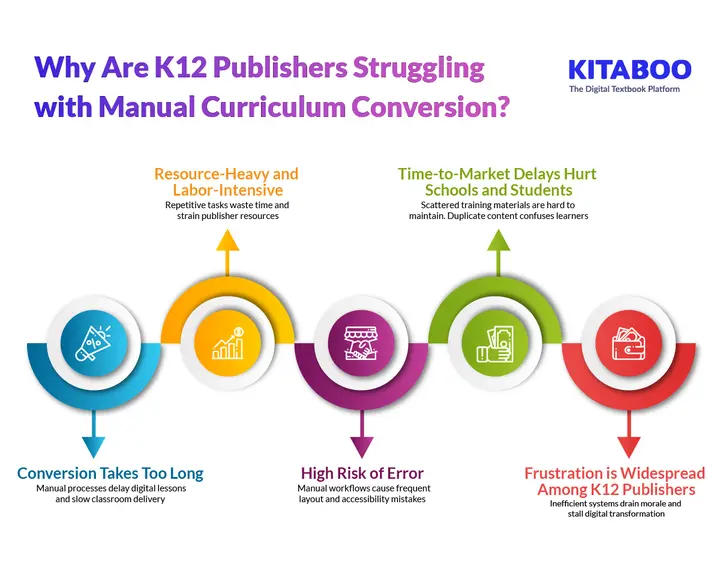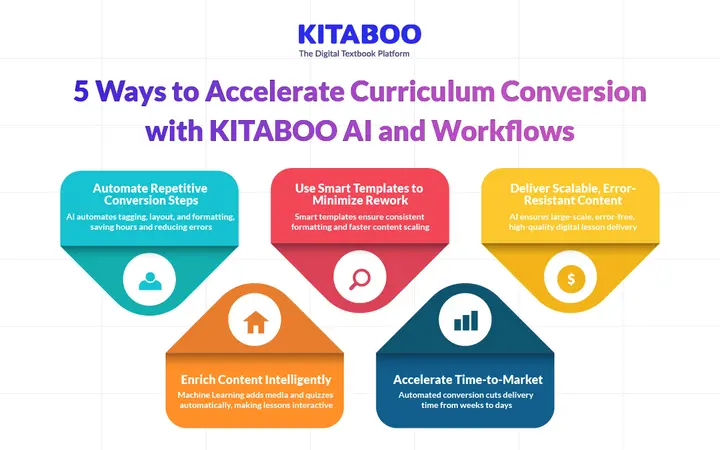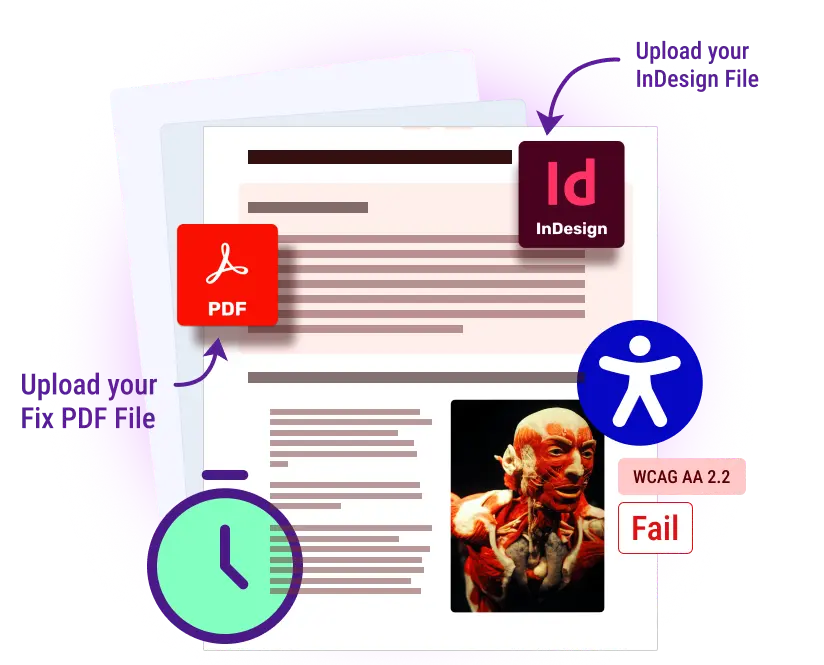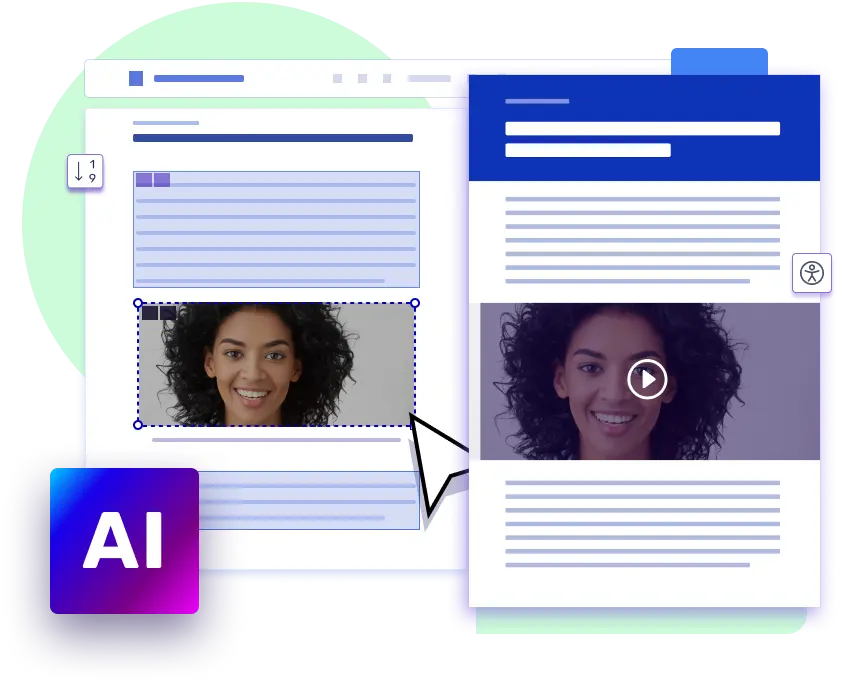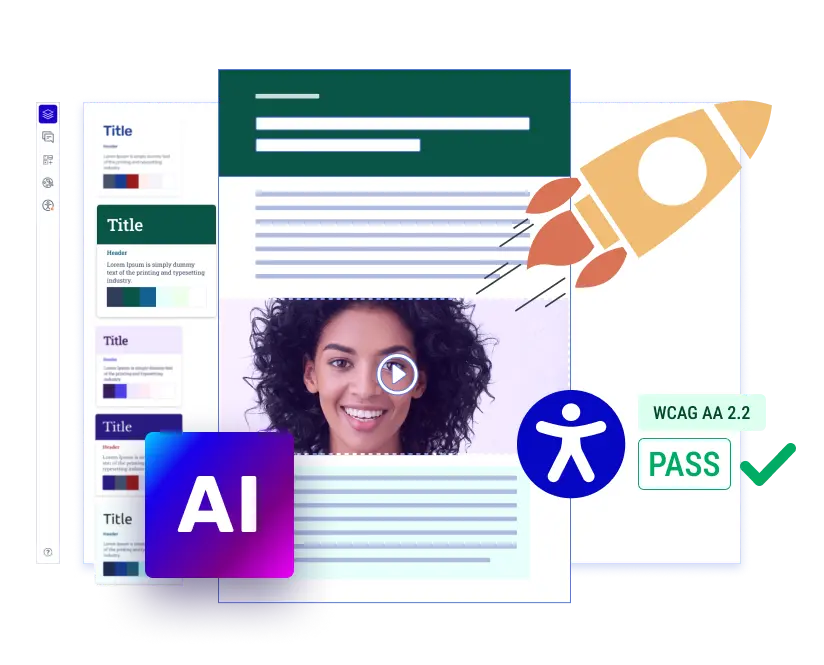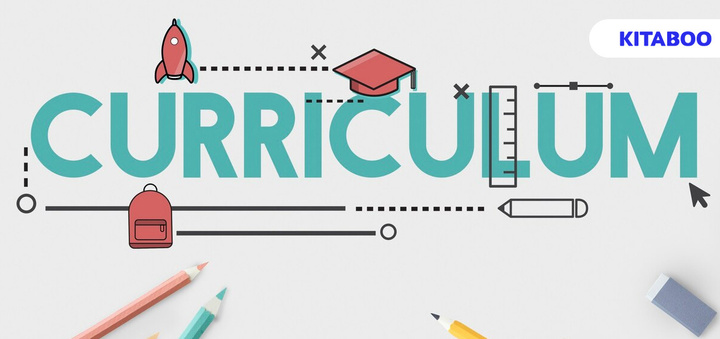
5 Ways to Accelerate Curriculum Conversion with KITABOO AI and Workflows
Summarize this blog with your favorite AI:
Accelerate Curriculum Conversion with KITABOO AI and Workflows – TL;DR
K12 publishers waste time and resources on slow, error-prone manual curriculum conversion. AI in curriculum publishing accelerates conversion and reduces errors. Schools receive lessons faster, improving student engagement and instructional planning.
KITABOO Fluid 360 automates repetitive tasks with automated eBook conversion and AI-driven content workflows. Smart curriculum design ensures consistent, ADA-compliant, interactive lessons across multiple schools. Publishers save time and scale content efficiently.
Here’s a snapshot of how KITABOO solves K12 curriculum conversion challenges efficiently.
| Pain Points in Manual Conversion | KITABOO Solution | Impact on K12 Publishers & Schools |
|---|---|---|
| Weeks spent on lesson conversion. | Automated eBook conversion. | Lessons reach classrooms faster. |
| Repetitive, labor-intensive work. | AI-driven content workflows. | Staff focus on instructional design. |
| High risk of errors and inconsistencies. | Smart curriculum design templates. | Accurate, accessible, and uniform content. |
| Difficulty scaling content. | Cloud-based conversion & enrichment. | Large content catalogs delivered reliably. |
| Delays affect student learning. | Faster time-to-market with AI. | Schools get interactive lessons on time. |
K12 publishers are racing against time to digitize legacy PDFs and print lessons. Manual curriculum conversion is painfully slow, error-prone, and drains valuable resources. Schools face inconsistent formats, inaccessible content, and delayed lessons that frustrate educators.
Weeks can pass before interactive materials reach classrooms, affecting learning outcomes. Publishers struggle with resource bottlenecks and escalating operational costs.
AI in curriculum publishing is emerging as the urgent solution needed to transform content faster and smarter.
Table of Contents
Why Are K12 Publishers Struggling with Manual Curriculum Conversion?
Curriculum conversion is the process of transforming print or PDF lessons into interactive, digital formats. K12 publishers are under immense pressure to deliver digital lessons on time. Manual curriculum conversion is dragging projects, wasting resources, and creating constant frustration.
Moving legacy PDFs and print assets into interactive, ADA-compliant formats is slow, error-prone, and expensive. Every delay risks schools receiving incomplete or inconsistent content, threatening trust and adoption. AI in curriculum publishing is the need of the hour.
1. Conversion Takes Too Long
Manual processes for transforming PDFs or print assets into digital lessons are painfully slow. Weeks or even months can pass before content reaches classrooms.
Every delay increases pressure on publishing teams. Schools struggle to plan lessons effectively when materials are late. Publishers feel the stress of falling behind in the digital transformation race.
2. Resource-Heavy and Labor-Intensive
Manual conversion requires large teams to handle repetitive tasks like formatting, tagging, and layout. Staff spend hours on work that offers little creative value.
This drains time during smart curriculum design and content improvement. Small errors multiply across thousands of pages, leading to rework. Publishers constantly juggle between different resources. This increases the time, operational costs, and frustration.
3. High Risk of Errors
Errors in layout, accessibility compliance, or multimedia integration are common with manual workflows. Americans with Disabilities Act (ADA) Standards are hard to maintain without automation.
Failing to meet ADA standards can put schools at risk of non-compliance. Every compliance mistake can delay adoption or force costly revisions.
Publishers lose credibility when content arrives with flaws. AI and Machine Learning in publishing can address this easily. However, without AI and ML, the fear of errors adds constant pressure.
4. Time-to-Market Delays Hurt Schools and Students
Slow conversion impacts lesson planning and student engagement. Schools cannot rely on timely delivery for interactive or accessible content. Students miss out on enriched digital learning experiences.
Publishers risk damaging relationships with districts and educators. Automated eBook conversion can solve this, but manual methods continue to cause delays.
5. Frustration is Widespread Among K12 Publishers
Manual conversion processes create repeated stress for publishing teams. High costs, wasted time, and endless rework lower morale. Publishers feel trapped in inefficient workflows.
Without faster, smarter solutions like AI-driven content workflows, they risk falling behind competitors. The urgency to adopt better tools grows with every delayed curriculum cycle.
How to Accelerate Curriculum Conversion with KITABOO AI and Workflows
K12 publishers face slow, error-prone manual curriculum conversion. KITABOO Fluid 360 is a cloud-based platform designed to accelerate AI in curriculum publishing. It enables you to build interactive and accessible digital content effortlessly.
It combines AI-driven content workflows, intelligent templates, and automated enrichment. It converts legacy PDFs and print assets into interactive, ADA-compliant digital lessons. Repetitive tasks like tagging, layout, and multimedia insertion are also automated.
Schools receive ready-to-use, high-quality content faster while publishers reduce errors and scale efficiently. The following five approaches show how KITABOO AI and workflows accelerate curriculum conversion.
1. Automate Repetitive Conversion Steps
AI-driven content workflows in KITABOO automate text extraction, tagging, and layout. Manual restructuring of PDFs and InDesign files is eliminated. Publishers save hours per lesson while reducing formatting errors.
KITABOO AI and workflow automation ensure consistent styling, accessibility, and multilingual accuracy across all content. Teams can focus on instructional design instead of tedious tasks.
By eliminating manual bottlenecks, publishers can convert more lessons in less time. This directly accelerates curriculum conversion and increases productivity. Automated eBook conversion ensures faster, error-free output across all grade levels.
2. Enrich Content Intelligently
Smart use of Machine Learning in publishing lets KITABOO enrich lessons automatically. Videos, quizzes, assessments, and glossaries are added without manual effort. KITABOO Fluid 360 ensures AI-assisted precision for reading order and compliance.
Lessons become interactive and accessible for students. Publishers maintain high-quality content while reducing production bottlenecks. Intelligent enrichment reduces repetitive editing and allows faster rollout of interactive lessons.
Publishers can deliver ready-to-use, engaging content sooner to multiple schools. AI-driven content workflows ensure lessons are enriched consistently across the curriculum.
3. Use Smart Templates to Minimize Rework
KITABOO Fluid 360 templates maintain consistent formatting across all lessons. Repetitive layout work is removed, speeding large-scale conversion.
Accessibility and multilingual integration are ensured. Templates apply curriculum standards automatically. Publishers scale content faster while keeping visual and instructional consistency.
Templates reduce errors and manual corrections, saving time across the conversion pipeline. Faster, consistent formatting directly accelerates curriculum conversion at scale. Smart curriculum design with templates ensures uniform lesson structure across all schools.
4. Accelerate Time-to-Market
Combining automated eBook conversion with AI-driven content workflows, KITABOO reduces turnaround time. Lessons that took weeks can now be ready in hours.
Schools receive interactive content faster, and publishers meet deadlines confidently. Rapid delivery helps respond quickly to curriculum updates.
Faster time-to-market allows schools to access updated lessons quickly. Publishers can complete conversion cycles efficiently, supporting academic schedules without delays. AI in curriculum publishing with KITABOO accelerates lesson delivery while maintaining high quality.
5. Deliver Scalable, Error-Resistant Content
KITABOO Fluid 360 makes content production efficient and cost-effective. By leveraging AI, it converts large content catalogs reliably at scale. Errors are minimized through automation and AI validation.
Publishers maintain quality while expanding offerings across multiple schools. Scalable solutions support fast adoption and smooth digital transformation. Scalable conversion also ensures large volumes of content are processed quickly without mistakes.
Publishers accelerate curriculum conversion while maintaining consistent quality across all schools. Machine Learning in publishing enables error-free, high-volume content delivery at speed.
How Does KITABOO AI Compare to Manual Curriculum Conversion?
Manual curriculum conversion is slow, resource-heavy, and prone to errors. K12 publishers struggle to meet deadlines and maintain quality.
AI in curriculum publishing through KITABOO Fluid 360 automates repetitive tasks. It also enriches content and ensures faster, scalable delivery. This table highlights key differences and efficiency gains:
Conclusion
Manual curriculum conversion slows K12 publishers and adds unnecessary errors. KITABOO Fluid 360 transforms the process with AI-driven content workflows, automated eBook conversion, and smart curriculum design.
It accelerates lesson creation, ensures ADA compliance, and scales content across multiple schools effortlessly. By automating repetitive tasks and enriching content intelligently, KITABOO empowers publishers to focus on high-quality instruction.
Take the first step toward faster, error-free curriculum conversion. Request an exclusive demo of KITABOO Fluid 360 today.
FAQs
It transforms print or PDF lessons into digital formats for faster, accessible learning delivery.
Manual processes are slow, error-prone, and costly, delaying lesson delivery and increasing workload.
AI in curriculum publishing automates tagging, layout, and enrichment, speeding up conversion and reducing errors.
Automated eBook conversion ensures fast, accurate, and consistent transformation of large content volumes.
Machine Learning in publishing improves tagging accuracy and structure for smarter, interactive lessons.
AI-driven content workflows streamline tasks, reduce manual effort, and accelerate curriculum conversion.
Discover how a mobile-first training platform can help your organization.
KITABOO is a cloud-based platform to create, deliver & track mobile-first interactive training content.
